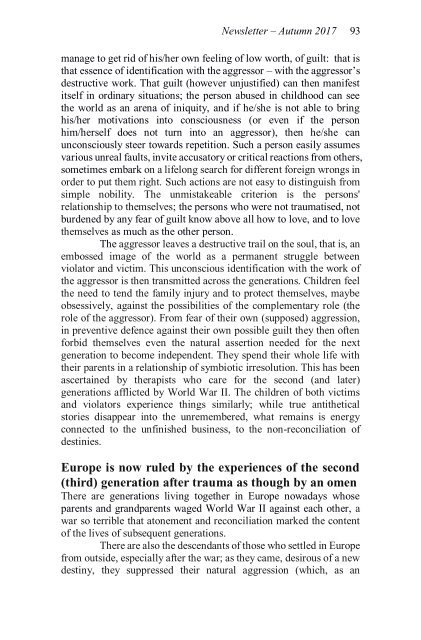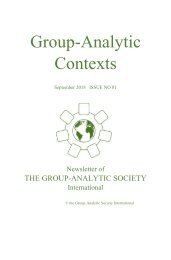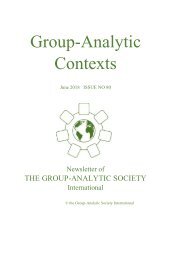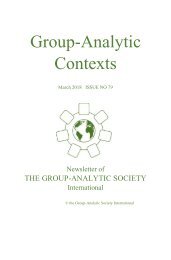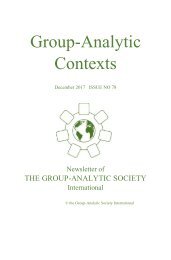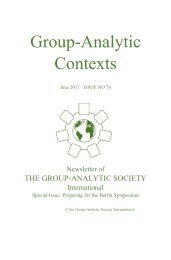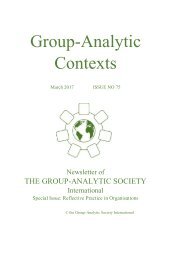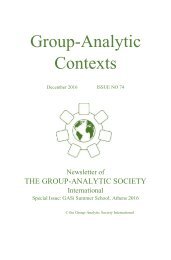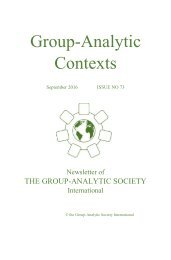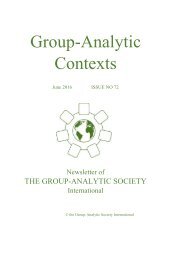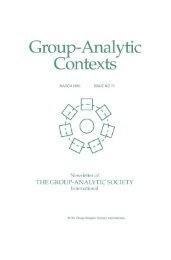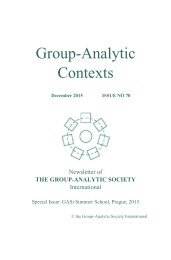Group Analytic Contexts, Issue 77, September 2017
Newsletter of the Group Analytic Society International
Newsletter of the Group Analytic Society International
Create successful ePaper yourself
Turn your PDF publications into a flip-book with our unique Google optimized e-Paper software.
Newsletter – Autumn <strong>2017</strong> 93<br />
manage to get rid of his/her own feeling of low worth, of guilt: that is<br />
that essence of identification with the aggressor – with the aggressor’s<br />
destructive work. That guilt (however unjustified) can then manifest<br />
itself in ordinary situations; the person abused in childhood can see<br />
the world as an arena of iniquity, and if he/she is not able to bring<br />
his/her motivations into consciousness (or even if the person<br />
him/herself does not turn into an aggressor), then he/she can<br />
unconsciously steer towards repetition. Such a person easily assumes<br />
various unreal faults, invite accusatory or critical reactions from others,<br />
sometimes embark on a lifelong search for different foreign wrongs in<br />
order to put them right. Such actions are not easy to distinguish from<br />
simple nobility. The unmistakeable criterion is the persons'<br />
relationship to themselves; the persons who were not traumatised, not<br />
burdened by any fear of guilt know above all how to love, and to love<br />
themselves as much as the other person.<br />
The aggressor leaves a destructive trail on the soul, that is, an<br />
embossed image of the world as a permanent struggle between<br />
violator and victim. This unconscious identification with the work of<br />
the aggressor is then transmitted across the generations. Children feel<br />
the need to tend the family injury and to protect themselves, maybe<br />
obsessively, against the possibilities of the complementary role (the<br />
role of the aggressor). From fear of their own (supposed) aggression,<br />
in preventive defence against their own possible guilt they then often<br />
forbid themselves even the natural assertion needed for the next<br />
generation to become independent. They spend their whole life with<br />
their parents in a relationship of symbiotic irresolution. This has been<br />
ascertained by therapists who care for the second (and later)<br />
generations afflicted by World War II. The children of both victims<br />
and violators experience things similarly; while true antithetical<br />
stories disappear into the unremembered, what remains is energy<br />
connected to the unfinished business, to the non-reconciliation of<br />
destinies.<br />
Europe is now ruled by the experiences of the second<br />
(third) generation after trauma as though by an omen<br />
There are generations living together in Europe nowadays whose<br />
parents and grandparents waged World War II against each other, a<br />
war so terrible that atonement and reconciliation marked the content<br />
of the lives of subsequent generations.<br />
There are also the descendants of those who settled in Europe<br />
from outside, especially after the war; as they came, desirous of a new<br />
destiny, they suppressed their natural aggression (which, as an


